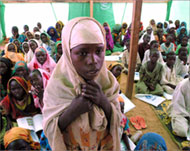ElBaradei criticises Security Council
The UN Security Council has too often failed to act swiftly and effectively to contain international crises and needs reforming, the head of the UN nuclear watchdog has said.

Mohamed ElBaradei, last year’s Nobel Peace Prize winner, said on Saturday: “Too often, the Security Council’s engagement is inadequate, selective or after the fact.”
“The tragedies of recent years in Rwanda, the Democratic Republic of the Congo and Darfur are cases in point,” he told an audience of made up mostly of German dentists before receiving an award for “global bridge building”.
His criticism of the UN body responsible for maintaining international peace and security comes as its five permanent members struggle to agree on a draft statement rebuking Iran for pressing ahead with a nuclear enrichment programme.
ElBaradei had opposed referral of Iran’s nuclear dossier to the Council, fearing opposition by veto-wielding members Russia and China would prevent it from doing anything, diplomats say.
Darfur and Iraq
In an annual lecture organised by a Karlsruhe Dental Institute, the Egyptian diplomat said the 15-nation Security Council had shown its ineffectiveness by failing to tackle violence in Sudan’s Darfur region.
“Darfur continues to suffer from the inability of the Security Council to muster sufficient peacekeeping troops and sufficient resources to prevent the continuing atrocities.”
 |
|
Darfar is suffer due to the UN |
On Friday, the Council voted to speed planning for a new UN peacekeeping force to be sent to Darfur later this year to relieve underfinanced African Union troops.
ElBaradei said the Council’s lack of success had also been visible in reference to arms control and Iraq.
“In the case of Iraq, the Council for over a decade imposed a series of blanket economic sanctions – which were manipulated to the advantage of the ruthless regime in power, and resulted in the death and suffering of hundreds of thousands of innocent civilians,” he said.
In 2003, the Council was unable to agree on either the need or timing of the use of force in Iraq, said the director-general of the Vienna-based International Atomic Energy Agency (IAEA).
“It is clearly time for the Security Council to be reformed, expanded and strengthened, as part of the current efforts to reform and revitalise the United ations,” he added.
Disarmament
He also urged all countries assumed to have nuclear weapons – the five permanent council members the United States, Russia, China, Britain and France as well as India, Pakistan and Israel – to take irreversible steps towards disarmament.
|
“In the case of Iraq, the Council for over a decade imposed a series of blanket economic sanctions – which were manipulated to the advantage of the ruthless regime in power” Mohamed ElBaradeiIAEA chief |
Without referring to them directly, he criticised statements from Washington and Jacques Chirac, the French president, about their willingness to use atomic weapons, saying they showed that “reliance on nuclear deterrence shows no signs of abating”.
There was also the problem of past Security Council resolutions that have been ignored, ElBaradei said.
He mentioned resolutions demanding that India and Pakistan refrain from any further testing and development of nuclear weapons or that Israel open its nuclear facilities to the IAEA.
Unlike the declared weapons states, India, Pakistan and Israel have never signed the nuclear Non-Proliferation Treaty.